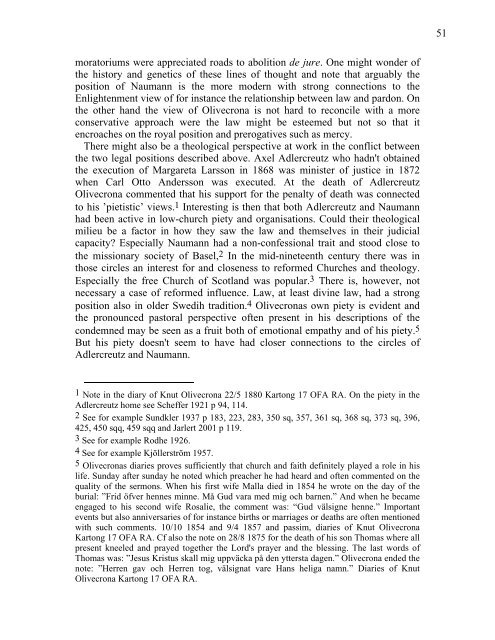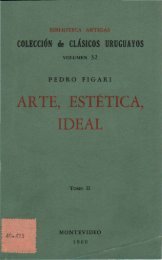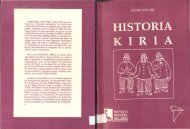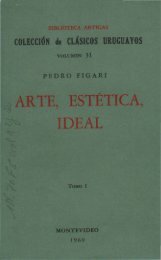Knut Olivecrona and his ”Om dödsstraffet”. - Figuras
Knut Olivecrona and his ”Om dödsstraffet”. - Figuras
Knut Olivecrona and his ”Om dödsstraffet”. - Figuras
Create successful ePaper yourself
Turn your PDF publications into a flip-book with our unique Google optimized e-Paper software.
moratoriums were appreciated roads to abolition de jure. One might wonder of<br />
the <strong>his</strong>tory <strong>and</strong> genetics of these lines of thought <strong>and</strong> note that arguably the<br />
position of Naumann is the more modern with strong connections to the<br />
Enlightenment view of for instance the relationship between law <strong>and</strong> pardon. On<br />
the other h<strong>and</strong> the view of <strong>Olivecrona</strong> is not hard to reconcile with a more<br />
conservative approach were the law might be esteemed but not so that it<br />
encroaches on the royal position <strong>and</strong> prerogatives such as mercy.<br />
There might also be a theological perspective at work in the conflict between<br />
the two legal positions described above. Axel Adlercreutz who hadn't obtained<br />
the execution of Margareta Larsson in 1868 was minister of justice in 1872<br />
when Carl Otto Andersson was executed. At the death of Adlercreutz<br />
<strong>Olivecrona</strong> commented that <strong>his</strong> support for the penalty of death was connected<br />
to <strong>his</strong> ’pietistic’ views.1 Interesting is then that both Adlercreutz <strong>and</strong> Naumann<br />
had been active in low-church piety <strong>and</strong> organisations. Could their theological<br />
milieu be a factor in how they saw the law <strong>and</strong> themselves in their judicial<br />
capacity? Especially Naumann had a non-confessional trait <strong>and</strong> stood close to<br />
the missionary society of Basel,2 In the mid-nineteenth century there was in<br />
those circles an interest for <strong>and</strong> closeness to reformed Churches <strong>and</strong> theology.<br />
Especially the free Church of Scotl<strong>and</strong> was popular. 3 There is, however, not<br />
necessary a case of reformed influence. Law, at least divine law, had a strong<br />
position also in older Swedih tradition.4 <strong>Olivecrona</strong>s own piety is evident <strong>and</strong><br />
the pronounced pastoral perspective often present in <strong>his</strong> descriptions of the<br />
condemned may be seen as a fruit both of emotional empathy <strong>and</strong> of <strong>his</strong> piety.5<br />
But <strong>his</strong> piety doesn't seem to have had closer connections to the circles of<br />
Adlercreutz <strong>and</strong> Naumann.<br />
1 Note in the diary of <strong>Knut</strong> <strong>Olivecrona</strong> 22/5 1880 Kartong 17 OFA RA. On the piety in the<br />
Adlercreutz home see Scheffer 1921 p 94, 114.<br />
2 See for example Sundkler 1937 p 183, 223, 283, 350 sq, 357, 361 sq, 368 sq, 373 sq, 396,<br />
425, 450 sqq, 459 sqq <strong>and</strong> Jarlert 2001 p 119.<br />
3 See for example Rodhe 1926.<br />
4 See for example Kjöllerström 1957.<br />
5 <strong>Olivecrona</strong>s diaries proves sufficiently that church <strong>and</strong> faith definitely played a role in <strong>his</strong><br />
life. Sunday after sunday he noted which preacher he had heard <strong>and</strong> often commented on the<br />
quality of the sermons. When <strong>his</strong> first wife Malla died in 1854 he wrote on the day of the<br />
burial: ”Frid öfver hennes minne. Må Gud vara med mig och barnen.” And when he became<br />
engaged to <strong>his</strong> second wife Rosalie, the comment was: “Gud välsigne henne.” Important<br />
events but also anniversaries of for instance births or marriages or deaths are often mentioned<br />
with such comments. 10/10 1854 <strong>and</strong> 9/4 1857 <strong>and</strong> passim, diaries of <strong>Knut</strong> <strong>Olivecrona</strong><br />
Kartong 17 OFA RA. Cf also the note on 28/8 1875 for the death of <strong>his</strong> son Thomas where all<br />
present kneeled <strong>and</strong> prayed together the Lord's prayer <strong>and</strong> the blessing. The last words of<br />
Thomas was: ”Jesus Kristus skall mig uppväcka på den yttersta dagen.” <strong>Olivecrona</strong> ended the<br />
note: ”Herren gav och Herren tog, välsignat vare Hans heliga namn.” Diaries of <strong>Knut</strong><br />
<strong>Olivecrona</strong> Kartong 17 OFA RA.<br />
51






